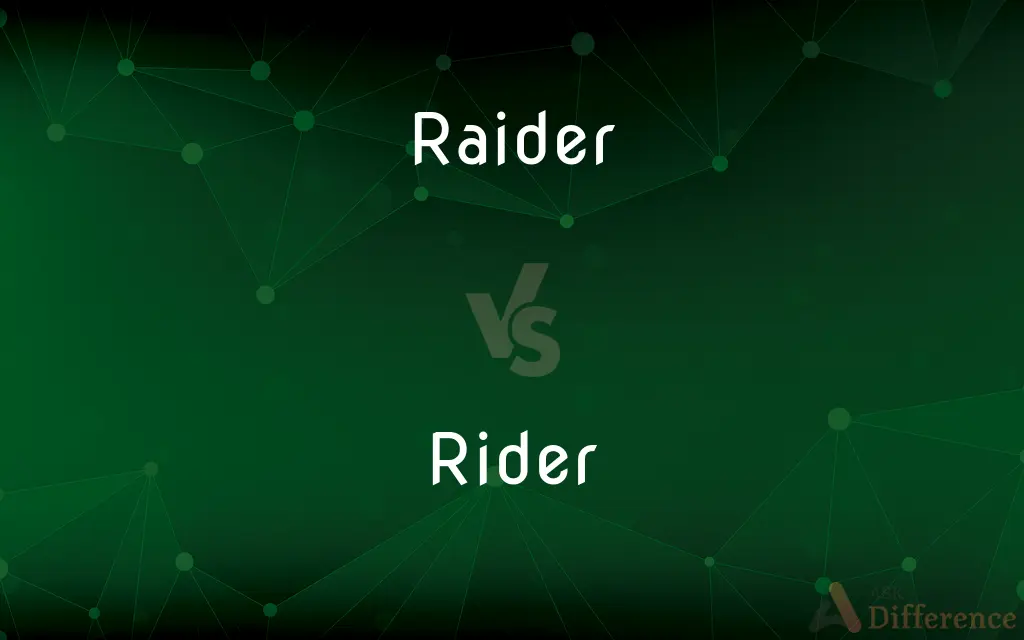Raider vs. Rider — What's the Difference?
Edited by Tayyaba Rehman — By Fiza Rafique — Updated on March 14, 2024
Raider emphasizes aggressive, often unauthorized incursion, whereas Rider implies someone mounted on or using a vehicle or animal for travel.

Difference Between Raider and Rider
Table of Contents
ADVERTISEMENT
Key Differences
A raider is typically associated with aggressive, often surprise attacks aimed at stealing or causing destruction. On the other hand, a rider refers to someone who rides something, usually an animal such as a horse or a vehicle like a motorcycle or bicycle.
While raiders are characterized by their focus on incursion and the element of surprise, riders are defined by their relationship with their mount or vehicle, emphasizing skill and movement. This distinction highlights the differing natures of the terms, with one rooted in conflict and acquisition and the other in travel and sport.
The societal perceptions of raiders and riders diverge significantly. Raiders are often viewed through a lens of hostility or fear due to their association with violence and theft. In contrast, riders are usually seen in a more neutral or positive light, appreciated for their skills or passion for riding.
The cultural and historical contexts of raiders and riders enrich their meanings. Raiders have a storied place in history, evoking images of conquests and adventurers. Riders, however, are celebrated for their mastery and enjoyment of riding, with a rich tradition in sports, recreation, and transportation.
Comparison Chart
Definition
An individual or group that engages in aggressive incursions
Someone who rides an animal or vehicle
ADVERTISEMENT
Purpose
To steal, destroy, or disrupt
For travel, sport, or enjoyment
Skill Set
Strategy, stealth, combat
Balance, control, movement
Societal Perception
Often negative due to association with violence
Neutral or positive, associated with skill
Context
Historical conquests, modern cyber attacks
Sports, recreation, transportation
Compare with Definitions
Raider
Historical Raider.
Vikings were feared raiders, known for their surprise attacks on European coasts.
Rider
Equestrian Rider.
The rider expertly navigated the horse through the challenging course.
Raider
Pirate.
Pirates of the Caribbean were notorious raiders of the seas, looting ships and coastal towns.
Rider
Professional Rider.
Professional riders compete in rodeos and racing events worldwide.
Raider
Fantasy Raider.
In fantasy worlds, raiders often seek treasures in dangerous lands.
Rider
Motorcycle Rider.
Motorcycle riders enjoy the freedom of the open road on two wheels.
Raider
Modern Cyber Raider.
Cyber raiders target digital assets, launching attacks on networks and databases.
Rider
Bicycle Rider.
Urban commuters often prefer being bicycle riders for daily travel.
Raider
Military Raider.
Special forces units often perform raider missions behind enemy lines.
Rider
Casual Rider.
She's a casual rider, enjoying horseback rides on weekends.
Raider
A surprise attack by a small armed force.
Rider
A person who is riding or who can ride a horse, bicycle, motorcycle, etc.
She was a skilled rider
Two riders approached the cottage
Raider
A sudden forcible entry into a place by police
A raid on a gambling den.
Rider
A condition or proviso added to something already agreed
One rider to the deal—if the hurricane heads north, we run for shelter
Raider
An entrance into another's territory for the purpose of seizing goods or valuables.
Rider
A small weight positioned on the beam of a balance for fine adjustment.
Raider
A predatory operation mounted against a competitor, especially an attempt to lure away the personnel or membership of a competing organization.
Rider
One that rides, especially one who rides horses.
Raider
An attempt to seize control of a company, as by acquiring a majority of its stock.
Rider
An unrelated provision added to a legislative bill as a means of trying to get the provision adopted along with the bill or to hamper the passage of the bill.
Raider
An attempt by speculators to drive stock prices down by coordinated selling.
Rider
An amendment or addition annexed to a document, of which it is considered to be a part. Also called allonge.
Raider
To make a raid on.
Rider
Something, such as the top rail of a fence, that rests on or is supported by something else.
Raider
To conduct a raid or participate in one.
Rider
A mounted person.
Raider
One who engages in a raid; a plunderer.
Rider
A knight, or other mounted warrior.
Raider
(business) A person who takes or attempts to take control of a firm against the will of current management by purchasing a controlling interest of stock and acquiring proxies.
Rider
An old Dutch gold coin with the figure of a man on horseback stamped upon it.
Raider
(military) A special forces operative; a commando.
Rider
(generally) Someone who rides a horse or (later) a bicycle, motorcycle etc.
Raider
A warship which is light, maneuverable, and fast-moving.
Rider
A mounted robber; a bandit, especially in the Scottish borders.
Raider
A warplane on an air raid.
Rider
(obsolete) Someone who breaks in or manages a horse; a riding master.
Raider
A law enforcement official who conducts a raid on a building in search for illicit goods.
Rider
An agent who goes out with samples of goods to obtain orders; a commercial traveller or travelling salesman.
Raider
(informal) A person who uncovers evidence of improper behavior within governmental or private organizations.
Rider
Someone riding in a vehicle; a passenger on public transport.
Raider
One who engages in a raid.
Rider
An addition, supplement.
Raider
Someone who takes spoils or plunder (as in war)
Rider
(politics) A supplementary clause added to a document after drafting, especially to a bill under the consideration of a legislature.
Raider
A corporate investor who intends to take over a company by buying a controlling interest in its stock and installing new management
Rider
An amendment or addition to an entertainer's performance contract, often covering a performer's equipment or food, drinks, and general comfort requirements.
Rider
An additional matter or question arising in corollary; a qualification.
Rider
A supplementary question, now especially in mathematics.
Rider
Technical senses.
Rider
(shipbuilding) An interior rib occasionally fixed in a ship's hold, reaching from the keelson to the beams of the lower deck, to strengthen the frame.
Rider
Rock material in a vein of ore, dividing it.
Rider
The second tier of casks in a vessel's hold.
Rider
A small, sliding piece of thin metal on a balance, used to determine small weights.
Rider
(cartomancy) The first Lenormand card, also known as either the horseman or the cavalier.
Rider
(chess) A piece, such as the rook or bishop, which moves any distance in one direction, as long as no other piece is in the way.
Rider
One who, or that which, rides.
Rider
Formerly, an agent who went out with samples of goods to obtain orders; a commercial traveler.
Rider
One who breaks or manages a horse.
Rider
An addition or amendment to a manuscript or other document, which is attached on a separate piece of paper; in legislative practice, an additional clause annexed to a bill while in course of passage; something extra or burdensome that is imposed.
After the third reading, a foolish man stood up to propose a rider.
This [question] was a rider which Mab found difficult to answer.
Rider
A problem of more than usual difficulty added to another on an examination paper.
Rider
A Dutch gold coin having the figure of a man on horseback stamped upon it.
His moldy money ! half a dozen riders.
Rider
Rock material in a vein of ore, dividing it.
Rider
An interior rib occasionally fixed in a ship's hold, reaching from the keelson to the beams of the lower deck, to strengthen her frame.
Rider
The second tier of casks in a vessel's hold.
Rider
A small forked weight which straddles the beam of a balance, along which it can be moved in the manner of the weight on a steelyard.
Rider
A robber.
Rider
A traveler who actively rides an animal (as a horse or camel)
Rider
A clause that is appended to a legislative bill
Rider
A traveler who actively rides a vehicle (as a bicycle or motorcycle)
Rider
A traveler riding in a vehicle (a boat or bus or car or plane or train etc) who is not operating it
Common Curiosities
Can a rider be considered a raider?
Not typically, as riders focus on skillful movement rather than incursion.
What skills are essential for a rider?
Balance, control, and an understanding of the ridden animal or vehicle.
What is the primary goal of a raider?
To engage in aggressive actions for theft, destruction, or disruption.
Can raiders operate in cyberspace?
Yes, cyber raiders attack digital infrastructures to steal or cause harm.
Are all raiders criminals?
In modern legal contexts, yes, but historically, raiders were often part of sanctioned military actions.
What is a key difference between raiders and pirates?
Pirates are specifically raiders at sea, while raiders can operate in various environments.
What equipment is essential for riders?
Safety gear like helmets and appropriate attire for control and protection.
Are raiders always part of a group?
Raiders can operate individually or in groups, depending on the context.
Do raiders have a positive or negative impact on history?
The impact is mixed; raiders often caused destruction, but they also played roles in shaping cultures and territories.
What motivates individuals to become raiders or riders?
Raiders are often motivated by gain or strategic advantage, while riders are driven by passion, sport, or necessity.
Is riding a professional sport?
Yes, there are many professional sports involving riding, such as horse racing and motorcycle racing.
Can riding be considered a form of art?
Yes, especially in disciplines like dressage or trick riding, where style and grace are paramount.
Why do raiders often use the element of surprise?
To overcome stronger defenses and reduce the risk of retaliation.
Are there environmental impacts of riding?
Yes, depending on the form of riding, impacts can range from minimal (equestrian) to significant (motorized vehicles).
How do societies view raiders in historical contexts?
Views vary; some cultures celebrate raiders as heroes, while others see them as villains.
Share Your Discovery

Previous Comparison
Beautiful vs. Pleasant
Next Comparison
Chant vs. LayAuthor Spotlight
Written by
Fiza RafiqueFiza Rafique is a skilled content writer at AskDifference.com, where she meticulously refines and enhances written pieces. Drawing from her vast editorial expertise, Fiza ensures clarity, accuracy, and precision in every article. Passionate about language, she continually seeks to elevate the quality of content for readers worldwide.
Edited by
Tayyaba RehmanTayyaba Rehman is a distinguished writer, currently serving as a primary contributor to askdifference.com. As a researcher in semantics and etymology, Tayyaba's passion for the complexity of languages and their distinctions has found a perfect home on the platform. Tayyaba delves into the intricacies of language, distinguishing between commonly confused words and phrases, thereby providing clarity for readers worldwide.















































